Mental Health Capacity Act 2005: Practice Analysis Report
VerifiedAdded on 2022/08/26
|16
|4725
|52
Report
AI Summary
This report provides a practice analysis of the Mental Health Capacity Act 2005 and its associated codes of practice, focusing on their application in healthcare settings. The analysis includes an introduction to the act, outlining its principles and legal framework for supporting individuals lacking mental capacity. It emphasizes the role of healthcare professionals in decision-making processes, particularly when addressing issues of human rights and patient welfare. A case study involving Mrs. MWY, a patient with dementia, is examined to illustrate the practical application of the act, including the Deprivation of Liberty Safeguards. The report assesses the patient's situation, considering factors like cognitive impairment, living arrangements, and the involvement of family members. It delves into the five principles of the act, assessing how they apply to Mrs. MWY's case and highlighting the importance of best interest assessments, standard authorizations, and the role of mental capacity advocates. The report underscores the significance of healthcare professionals understanding and applying the act to ensure patient rights, promote autonomy, and provide appropriate care for individuals with mental health disabilities.
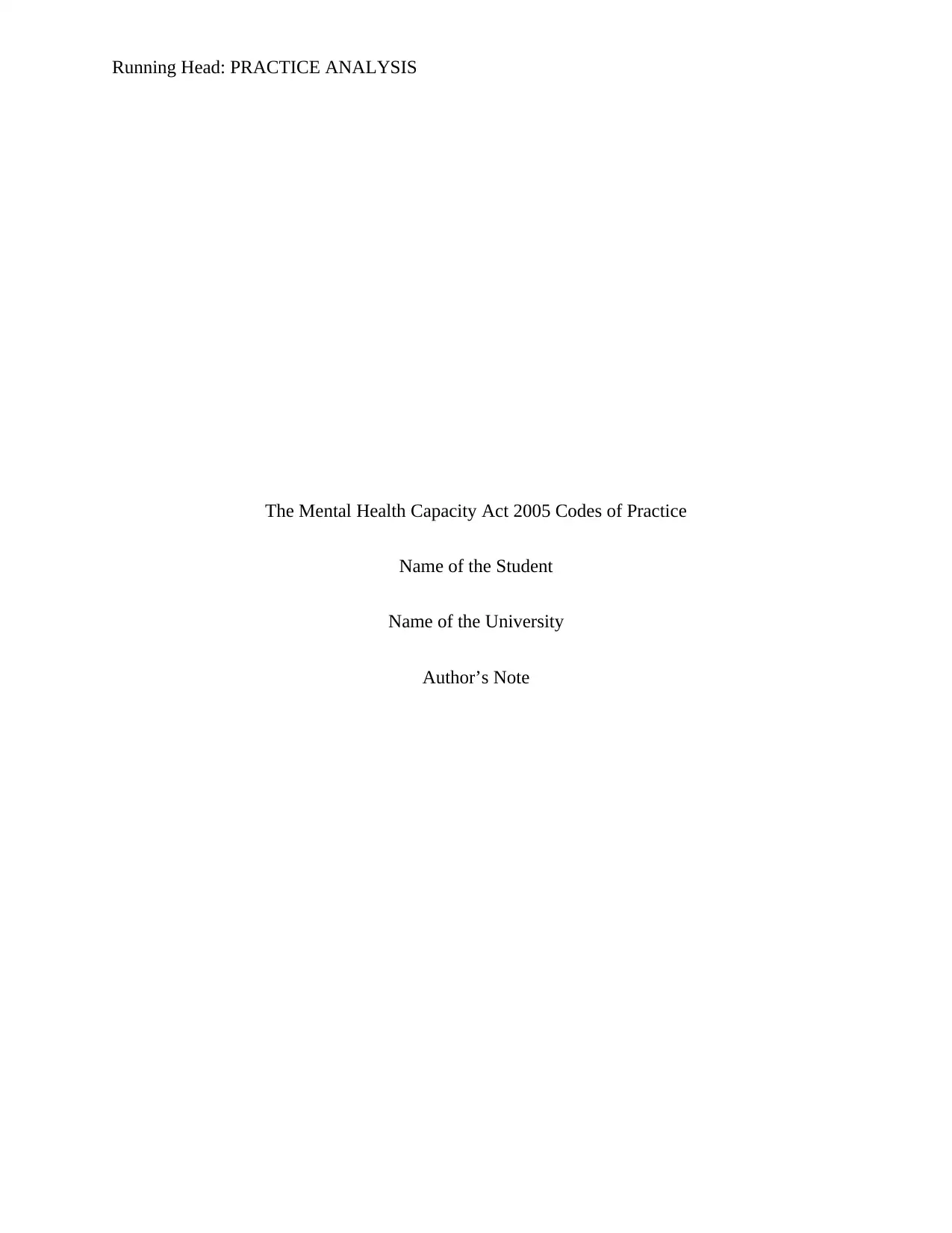
Running Head: PRACTICE ANALYSIS
The Mental Health Capacity Act 2005 Codes of Practice
Name of the Student
Name of the University
Author’s Note
The Mental Health Capacity Act 2005 Codes of Practice
Name of the Student
Name of the University
Author’s Note
Paraphrase This Document
Need a fresh take? Get an instant paraphrase of this document with our AI Paraphraser
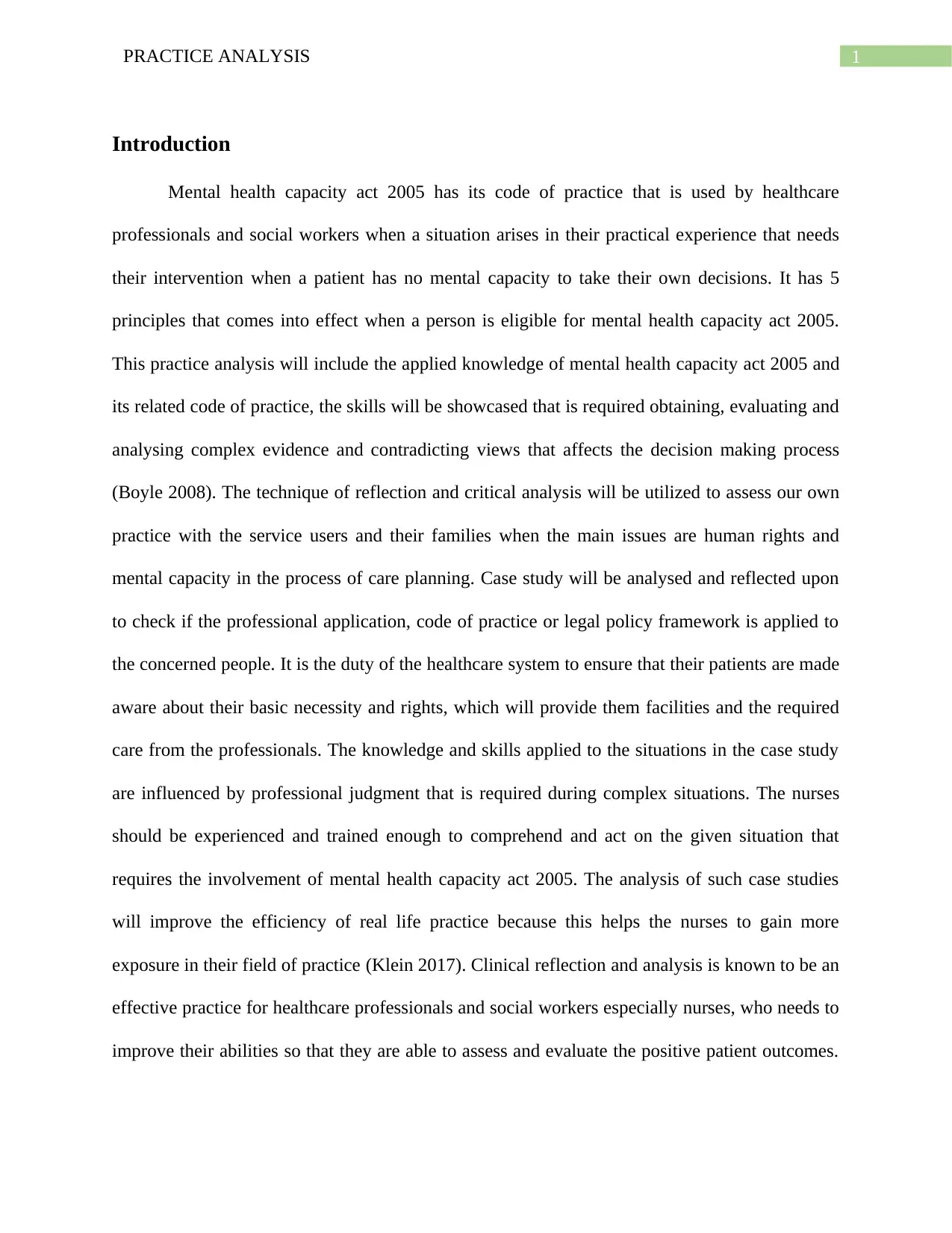
1PRACTICE ANALYSIS
Introduction
Mental health capacity act 2005 has its code of practice that is used by healthcare
professionals and social workers when a situation arises in their practical experience that needs
their intervention when a patient has no mental capacity to take their own decisions. It has 5
principles that comes into effect when a person is eligible for mental health capacity act 2005.
This practice analysis will include the applied knowledge of mental health capacity act 2005 and
its related code of practice, the skills will be showcased that is required obtaining, evaluating and
analysing complex evidence and contradicting views that affects the decision making process
(Boyle 2008). The technique of reflection and critical analysis will be utilized to assess our own
practice with the service users and their families when the main issues are human rights and
mental capacity in the process of care planning. Case study will be analysed and reflected upon
to check if the professional application, code of practice or legal policy framework is applied to
the concerned people. It is the duty of the healthcare system to ensure that their patients are made
aware about their basic necessity and rights, which will provide them facilities and the required
care from the professionals. The knowledge and skills applied to the situations in the case study
are influenced by professional judgment that is required during complex situations. The nurses
should be experienced and trained enough to comprehend and act on the given situation that
requires the involvement of mental health capacity act 2005. The analysis of such case studies
will improve the efficiency of real life practice because this helps the nurses to gain more
exposure in their field of practice (Klein 2017). Clinical reflection and analysis is known to be an
effective practice for healthcare professionals and social workers especially nurses, who needs to
improve their abilities so that they are able to assess and evaluate the positive patient outcomes.
Introduction
Mental health capacity act 2005 has its code of practice that is used by healthcare
professionals and social workers when a situation arises in their practical experience that needs
their intervention when a patient has no mental capacity to take their own decisions. It has 5
principles that comes into effect when a person is eligible for mental health capacity act 2005.
This practice analysis will include the applied knowledge of mental health capacity act 2005 and
its related code of practice, the skills will be showcased that is required obtaining, evaluating and
analysing complex evidence and contradicting views that affects the decision making process
(Boyle 2008). The technique of reflection and critical analysis will be utilized to assess our own
practice with the service users and their families when the main issues are human rights and
mental capacity in the process of care planning. Case study will be analysed and reflected upon
to check if the professional application, code of practice or legal policy framework is applied to
the concerned people. It is the duty of the healthcare system to ensure that their patients are made
aware about their basic necessity and rights, which will provide them facilities and the required
care from the professionals. The knowledge and skills applied to the situations in the case study
are influenced by professional judgment that is required during complex situations. The nurses
should be experienced and trained enough to comprehend and act on the given situation that
requires the involvement of mental health capacity act 2005. The analysis of such case studies
will improve the efficiency of real life practice because this helps the nurses to gain more
exposure in their field of practice (Klein 2017). Clinical reflection and analysis is known to be an
effective practice for healthcare professionals and social workers especially nurses, who needs to
improve their abilities so that they are able to assess and evaluate the positive patient outcomes.
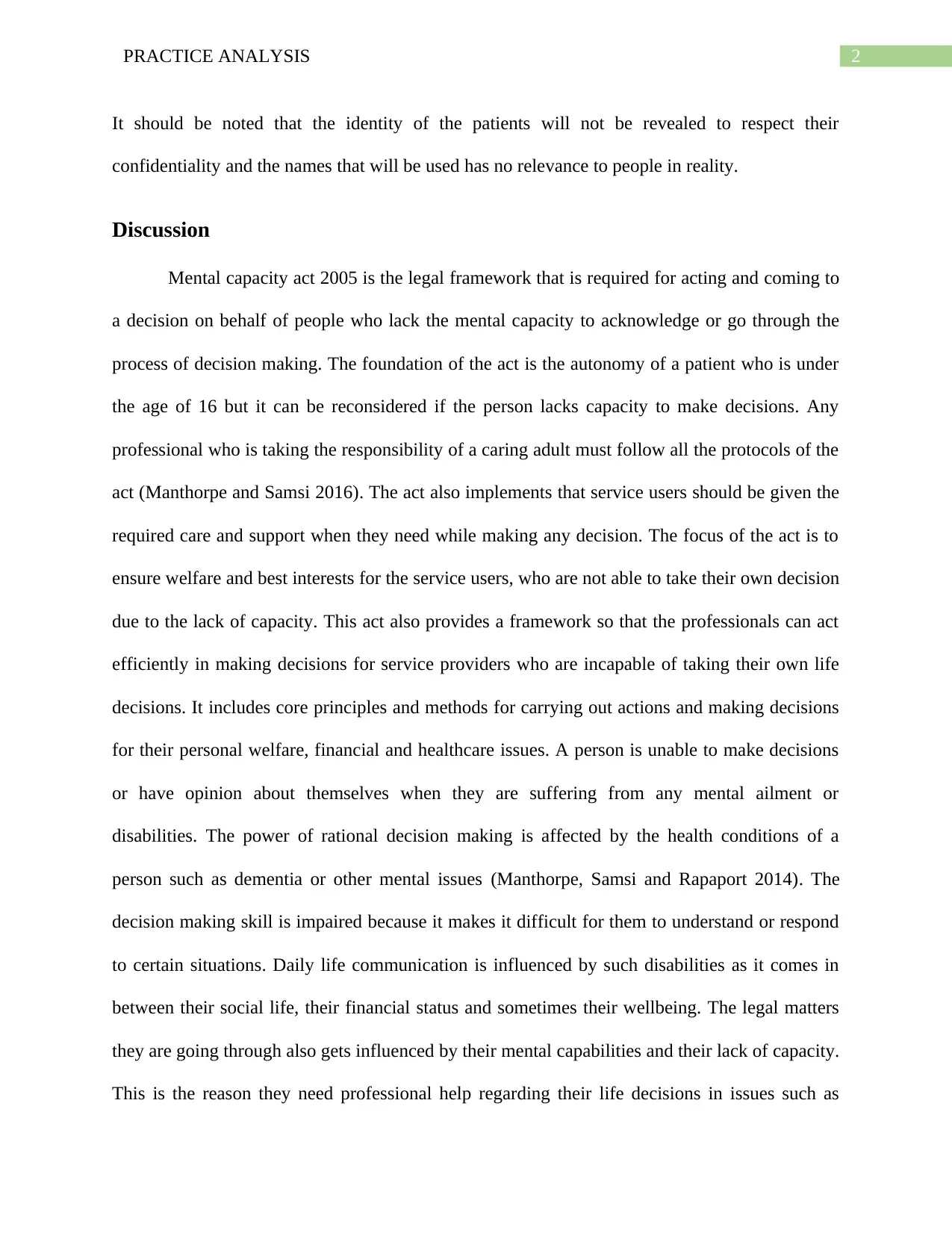
2PRACTICE ANALYSIS
It should be noted that the identity of the patients will not be revealed to respect their
confidentiality and the names that will be used has no relevance to people in reality.
Discussion
Mental capacity act 2005 is the legal framework that is required for acting and coming to
a decision on behalf of people who lack the mental capacity to acknowledge or go through the
process of decision making. The foundation of the act is the autonomy of a patient who is under
the age of 16 but it can be reconsidered if the person lacks capacity to make decisions. Any
professional who is taking the responsibility of a caring adult must follow all the protocols of the
act (Manthorpe and Samsi 2016). The act also implements that service users should be given the
required care and support when they need while making any decision. The focus of the act is to
ensure welfare and best interests for the service users, who are not able to take their own decision
due to the lack of capacity. This act also provides a framework so that the professionals can act
efficiently in making decisions for service providers who are incapable of taking their own life
decisions. It includes core principles and methods for carrying out actions and making decisions
for their personal welfare, financial and healthcare issues. A person is unable to make decisions
or have opinion about themselves when they are suffering from any mental ailment or
disabilities. The power of rational decision making is affected by the health conditions of a
person such as dementia or other mental issues (Manthorpe, Samsi and Rapaport 2014). The
decision making skill is impaired because it makes it difficult for them to understand or respond
to certain situations. Daily life communication is influenced by such disabilities as it comes in
between their social life, their financial status and sometimes their wellbeing. The legal matters
they are going through also gets influenced by their mental capabilities and their lack of capacity.
This is the reason they need professional help regarding their life decisions in issues such as
It should be noted that the identity of the patients will not be revealed to respect their
confidentiality and the names that will be used has no relevance to people in reality.
Discussion
Mental capacity act 2005 is the legal framework that is required for acting and coming to
a decision on behalf of people who lack the mental capacity to acknowledge or go through the
process of decision making. The foundation of the act is the autonomy of a patient who is under
the age of 16 but it can be reconsidered if the person lacks capacity to make decisions. Any
professional who is taking the responsibility of a caring adult must follow all the protocols of the
act (Manthorpe and Samsi 2016). The act also implements that service users should be given the
required care and support when they need while making any decision. The focus of the act is to
ensure welfare and best interests for the service users, who are not able to take their own decision
due to the lack of capacity. This act also provides a framework so that the professionals can act
efficiently in making decisions for service providers who are incapable of taking their own life
decisions. It includes core principles and methods for carrying out actions and making decisions
for their personal welfare, financial and healthcare issues. A person is unable to make decisions
or have opinion about themselves when they are suffering from any mental ailment or
disabilities. The power of rational decision making is affected by the health conditions of a
person such as dementia or other mental issues (Manthorpe, Samsi and Rapaport 2014). The
decision making skill is impaired because it makes it difficult for them to understand or respond
to certain situations. Daily life communication is influenced by such disabilities as it comes in
between their social life, their financial status and sometimes their wellbeing. The legal matters
they are going through also gets influenced by their mental capabilities and their lack of capacity.
This is the reason they need professional help regarding their life decisions in issues such as
⊘ This is a preview!⊘
Do you want full access?
Subscribe today to unlock all pages.

Trusted by 1+ million students worldwide
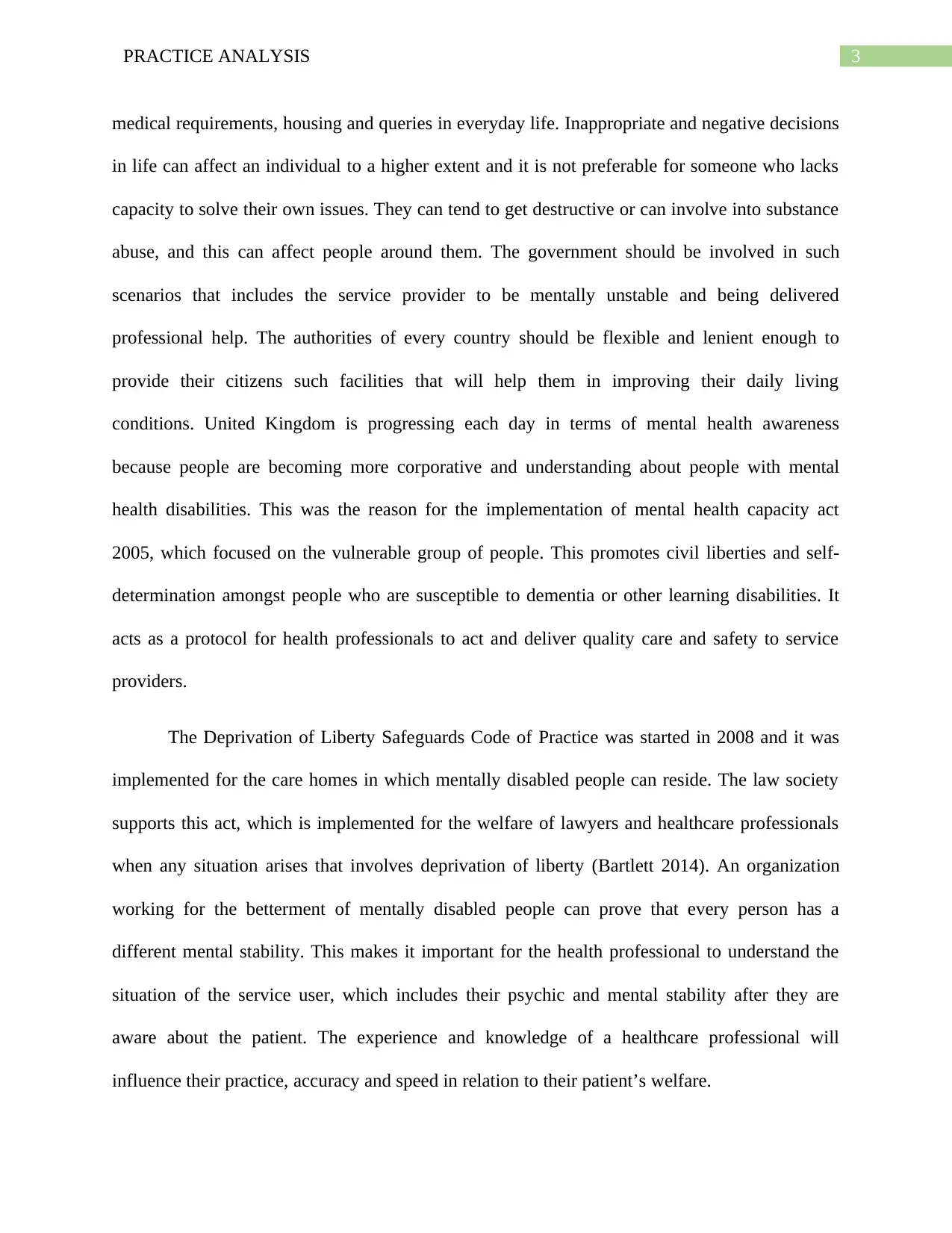
3PRACTICE ANALYSIS
medical requirements, housing and queries in everyday life. Inappropriate and negative decisions
in life can affect an individual to a higher extent and it is not preferable for someone who lacks
capacity to solve their own issues. They can tend to get destructive or can involve into substance
abuse, and this can affect people around them. The government should be involved in such
scenarios that includes the service provider to be mentally unstable and being delivered
professional help. The authorities of every country should be flexible and lenient enough to
provide their citizens such facilities that will help them in improving their daily living
conditions. United Kingdom is progressing each day in terms of mental health awareness
because people are becoming more corporative and understanding about people with mental
health disabilities. This was the reason for the implementation of mental health capacity act
2005, which focused on the vulnerable group of people. This promotes civil liberties and self-
determination amongst people who are susceptible to dementia or other learning disabilities. It
acts as a protocol for health professionals to act and deliver quality care and safety to service
providers.
The Deprivation of Liberty Safeguards Code of Practice was started in 2008 and it was
implemented for the care homes in which mentally disabled people can reside. The law society
supports this act, which is implemented for the welfare of lawyers and healthcare professionals
when any situation arises that involves deprivation of liberty (Bartlett 2014). An organization
working for the betterment of mentally disabled people can prove that every person has a
different mental stability. This makes it important for the health professional to understand the
situation of the service user, which includes their psychic and mental stability after they are
aware about the patient. The experience and knowledge of a healthcare professional will
influence their practice, accuracy and speed in relation to their patient’s welfare.
medical requirements, housing and queries in everyday life. Inappropriate and negative decisions
in life can affect an individual to a higher extent and it is not preferable for someone who lacks
capacity to solve their own issues. They can tend to get destructive or can involve into substance
abuse, and this can affect people around them. The government should be involved in such
scenarios that includes the service provider to be mentally unstable and being delivered
professional help. The authorities of every country should be flexible and lenient enough to
provide their citizens such facilities that will help them in improving their daily living
conditions. United Kingdom is progressing each day in terms of mental health awareness
because people are becoming more corporative and understanding about people with mental
health disabilities. This was the reason for the implementation of mental health capacity act
2005, which focused on the vulnerable group of people. This promotes civil liberties and self-
determination amongst people who are susceptible to dementia or other learning disabilities. It
acts as a protocol for health professionals to act and deliver quality care and safety to service
providers.
The Deprivation of Liberty Safeguards Code of Practice was started in 2008 and it was
implemented for the care homes in which mentally disabled people can reside. The law society
supports this act, which is implemented for the welfare of lawyers and healthcare professionals
when any situation arises that involves deprivation of liberty (Bartlett 2014). An organization
working for the betterment of mentally disabled people can prove that every person has a
different mental stability. This makes it important for the health professional to understand the
situation of the service user, which includes their psychic and mental stability after they are
aware about the patient. The experience and knowledge of a healthcare professional will
influence their practice, accuracy and speed in relation to their patient’s welfare.
Paraphrase This Document
Need a fresh take? Get an instant paraphrase of this document with our AI Paraphraser
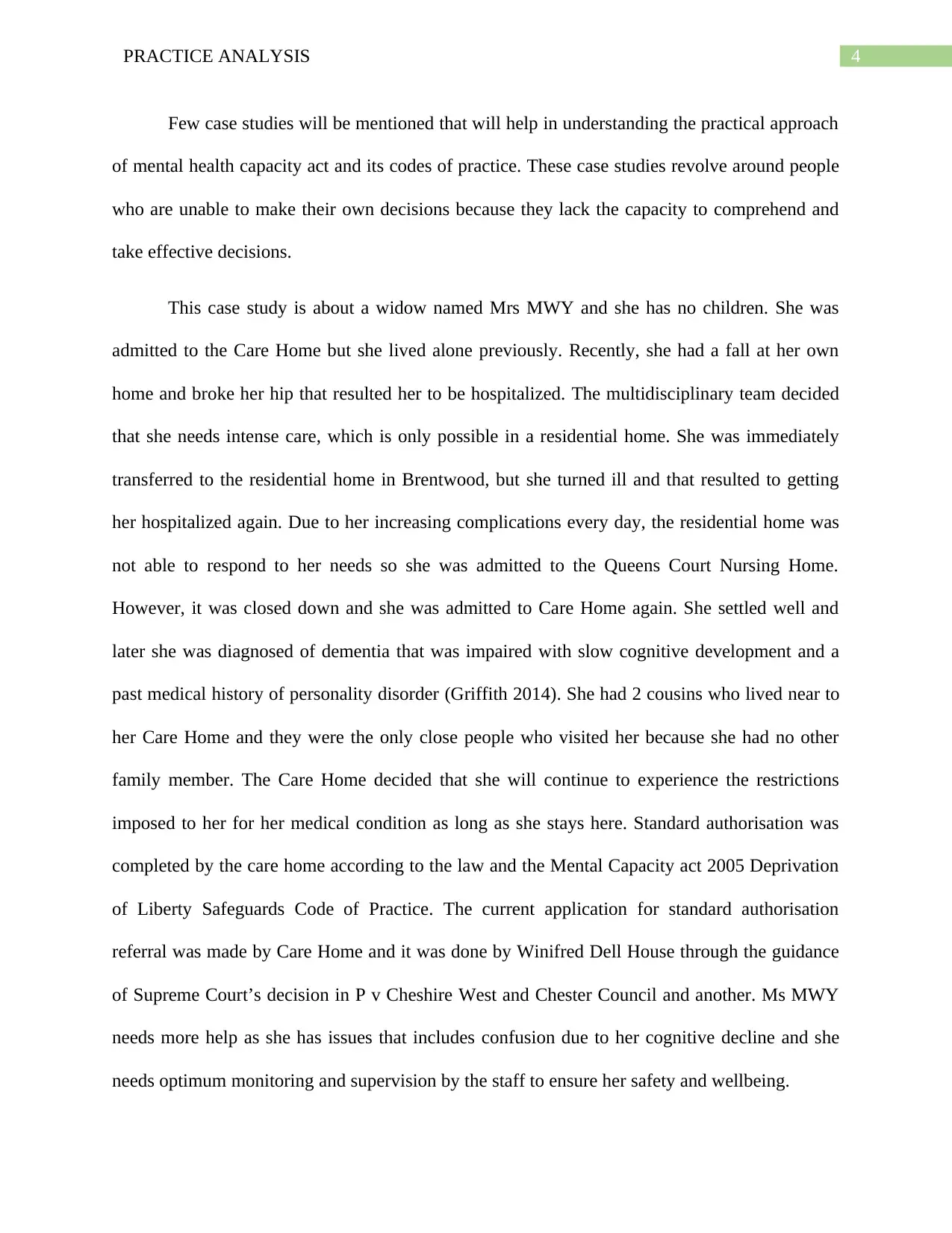
4PRACTICE ANALYSIS
Few case studies will be mentioned that will help in understanding the practical approach
of mental health capacity act and its codes of practice. These case studies revolve around people
who are unable to make their own decisions because they lack the capacity to comprehend and
take effective decisions.
This case study is about a widow named Mrs MWY and she has no children. She was
admitted to the Care Home but she lived alone previously. Recently, she had a fall at her own
home and broke her hip that resulted her to be hospitalized. The multidisciplinary team decided
that she needs intense care, which is only possible in a residential home. She was immediately
transferred to the residential home in Brentwood, but she turned ill and that resulted to getting
her hospitalized again. Due to her increasing complications every day, the residential home was
not able to respond to her needs so she was admitted to the Queens Court Nursing Home.
However, it was closed down and she was admitted to Care Home again. She settled well and
later she was diagnosed of dementia that was impaired with slow cognitive development and a
past medical history of personality disorder (Griffith 2014). She had 2 cousins who lived near to
her Care Home and they were the only close people who visited her because she had no other
family member. The Care Home decided that she will continue to experience the restrictions
imposed to her for her medical condition as long as she stays here. Standard authorisation was
completed by the care home according to the law and the Mental Capacity act 2005 Deprivation
of Liberty Safeguards Code of Practice. The current application for standard authorisation
referral was made by Care Home and it was done by Winifred Dell House through the guidance
of Supreme Court’s decision in P v Cheshire West and Chester Council and another. Ms MWY
needs more help as she has issues that includes confusion due to her cognitive decline and she
needs optimum monitoring and supervision by the staff to ensure her safety and wellbeing.
Few case studies will be mentioned that will help in understanding the practical approach
of mental health capacity act and its codes of practice. These case studies revolve around people
who are unable to make their own decisions because they lack the capacity to comprehend and
take effective decisions.
This case study is about a widow named Mrs MWY and she has no children. She was
admitted to the Care Home but she lived alone previously. Recently, she had a fall at her own
home and broke her hip that resulted her to be hospitalized. The multidisciplinary team decided
that she needs intense care, which is only possible in a residential home. She was immediately
transferred to the residential home in Brentwood, but she turned ill and that resulted to getting
her hospitalized again. Due to her increasing complications every day, the residential home was
not able to respond to her needs so she was admitted to the Queens Court Nursing Home.
However, it was closed down and she was admitted to Care Home again. She settled well and
later she was diagnosed of dementia that was impaired with slow cognitive development and a
past medical history of personality disorder (Griffith 2014). She had 2 cousins who lived near to
her Care Home and they were the only close people who visited her because she had no other
family member. The Care Home decided that she will continue to experience the restrictions
imposed to her for her medical condition as long as she stays here. Standard authorisation was
completed by the care home according to the law and the Mental Capacity act 2005 Deprivation
of Liberty Safeguards Code of Practice. The current application for standard authorisation
referral was made by Care Home and it was done by Winifred Dell House through the guidance
of Supreme Court’s decision in P v Cheshire West and Chester Council and another. Ms MWY
needs more help as she has issues that includes confusion due to her cognitive decline and she
needs optimum monitoring and supervision by the staff to ensure her safety and wellbeing.
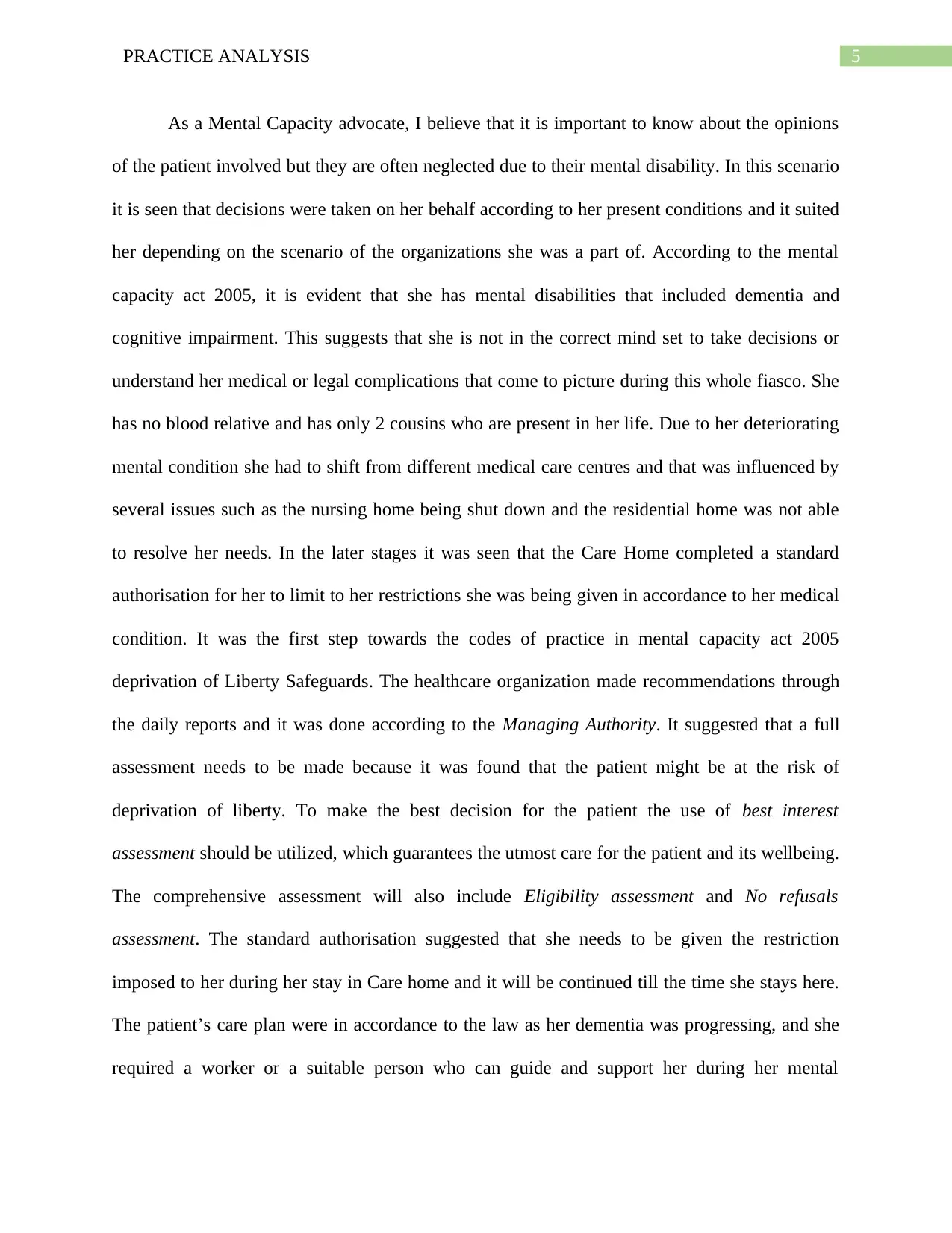
5PRACTICE ANALYSIS
As a Mental Capacity advocate, I believe that it is important to know about the opinions
of the patient involved but they are often neglected due to their mental disability. In this scenario
it is seen that decisions were taken on her behalf according to her present conditions and it suited
her depending on the scenario of the organizations she was a part of. According to the mental
capacity act 2005, it is evident that she has mental disabilities that included dementia and
cognitive impairment. This suggests that she is not in the correct mind set to take decisions or
understand her medical or legal complications that come to picture during this whole fiasco. She
has no blood relative and has only 2 cousins who are present in her life. Due to her deteriorating
mental condition she had to shift from different medical care centres and that was influenced by
several issues such as the nursing home being shut down and the residential home was not able
to resolve her needs. In the later stages it was seen that the Care Home completed a standard
authorisation for her to limit to her restrictions she was being given in accordance to her medical
condition. It was the first step towards the codes of practice in mental capacity act 2005
deprivation of Liberty Safeguards. The healthcare organization made recommendations through
the daily reports and it was done according to the Managing Authority. It suggested that a full
assessment needs to be made because it was found that the patient might be at the risk of
deprivation of liberty. To make the best decision for the patient the use of best interest
assessment should be utilized, which guarantees the utmost care for the patient and its wellbeing.
The comprehensive assessment will also include Eligibility assessment and No refusals
assessment. The standard authorisation suggested that she needs to be given the restriction
imposed to her during her stay in Care home and it will be continued till the time she stays here.
The patient’s care plan were in accordance to the law as her dementia was progressing, and she
required a worker or a suitable person who can guide and support her during her mental
As a Mental Capacity advocate, I believe that it is important to know about the opinions
of the patient involved but they are often neglected due to their mental disability. In this scenario
it is seen that decisions were taken on her behalf according to her present conditions and it suited
her depending on the scenario of the organizations she was a part of. According to the mental
capacity act 2005, it is evident that she has mental disabilities that included dementia and
cognitive impairment. This suggests that she is not in the correct mind set to take decisions or
understand her medical or legal complications that come to picture during this whole fiasco. She
has no blood relative and has only 2 cousins who are present in her life. Due to her deteriorating
mental condition she had to shift from different medical care centres and that was influenced by
several issues such as the nursing home being shut down and the residential home was not able
to resolve her needs. In the later stages it was seen that the Care Home completed a standard
authorisation for her to limit to her restrictions she was being given in accordance to her medical
condition. It was the first step towards the codes of practice in mental capacity act 2005
deprivation of Liberty Safeguards. The healthcare organization made recommendations through
the daily reports and it was done according to the Managing Authority. It suggested that a full
assessment needs to be made because it was found that the patient might be at the risk of
deprivation of liberty. To make the best decision for the patient the use of best interest
assessment should be utilized, which guarantees the utmost care for the patient and its wellbeing.
The comprehensive assessment will also include Eligibility assessment and No refusals
assessment. The standard authorisation suggested that she needs to be given the restriction
imposed to her during her stay in Care home and it will be continued till the time she stays here.
The patient’s care plan were in accordance to the law as her dementia was progressing, and she
required a worker or a suitable person who can guide and support her during her mental
⊘ This is a preview!⊘
Do you want full access?
Subscribe today to unlock all pages.

Trusted by 1+ million students worldwide
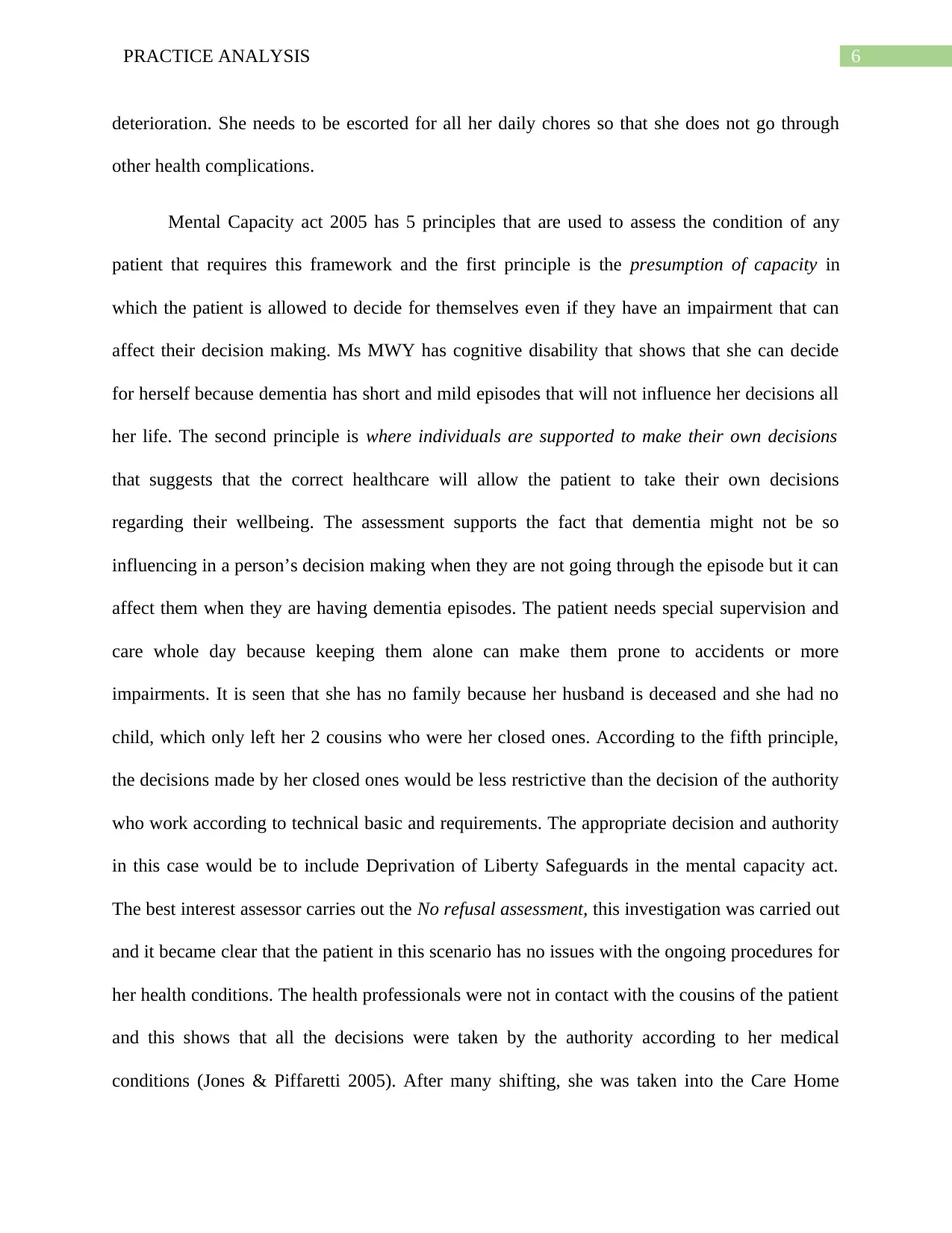
6PRACTICE ANALYSIS
deterioration. She needs to be escorted for all her daily chores so that she does not go through
other health complications.
Mental Capacity act 2005 has 5 principles that are used to assess the condition of any
patient that requires this framework and the first principle is the presumption of capacity in
which the patient is allowed to decide for themselves even if they have an impairment that can
affect their decision making. Ms MWY has cognitive disability that shows that she can decide
for herself because dementia has short and mild episodes that will not influence her decisions all
her life. The second principle is where individuals are supported to make their own decisions
that suggests that the correct healthcare will allow the patient to take their own decisions
regarding their wellbeing. The assessment supports the fact that dementia might not be so
influencing in a person’s decision making when they are not going through the episode but it can
affect them when they are having dementia episodes. The patient needs special supervision and
care whole day because keeping them alone can make them prone to accidents or more
impairments. It is seen that she has no family because her husband is deceased and she had no
child, which only left her 2 cousins who were her closed ones. According to the fifth principle,
the decisions made by her closed ones would be less restrictive than the decision of the authority
who work according to technical basic and requirements. The appropriate decision and authority
in this case would be to include Deprivation of Liberty Safeguards in the mental capacity act.
The best interest assessor carries out the No refusal assessment, this investigation was carried out
and it became clear that the patient in this scenario has no issues with the ongoing procedures for
her health conditions. The health professionals were not in contact with the cousins of the patient
and this shows that all the decisions were taken by the authority according to her medical
conditions (Jones & Piffaretti 2005). After many shifting, she was taken into the Care Home
deterioration. She needs to be escorted for all her daily chores so that she does not go through
other health complications.
Mental Capacity act 2005 has 5 principles that are used to assess the condition of any
patient that requires this framework and the first principle is the presumption of capacity in
which the patient is allowed to decide for themselves even if they have an impairment that can
affect their decision making. Ms MWY has cognitive disability that shows that she can decide
for herself because dementia has short and mild episodes that will not influence her decisions all
her life. The second principle is where individuals are supported to make their own decisions
that suggests that the correct healthcare will allow the patient to take their own decisions
regarding their wellbeing. The assessment supports the fact that dementia might not be so
influencing in a person’s decision making when they are not going through the episode but it can
affect them when they are having dementia episodes. The patient needs special supervision and
care whole day because keeping them alone can make them prone to accidents or more
impairments. It is seen that she has no family because her husband is deceased and she had no
child, which only left her 2 cousins who were her closed ones. According to the fifth principle,
the decisions made by her closed ones would be less restrictive than the decision of the authority
who work according to technical basic and requirements. The appropriate decision and authority
in this case would be to include Deprivation of Liberty Safeguards in the mental capacity act.
The best interest assessor carries out the No refusal assessment, this investigation was carried out
and it became clear that the patient in this scenario has no issues with the ongoing procedures for
her health conditions. The health professionals were not in contact with the cousins of the patient
and this shows that all the decisions were taken by the authority according to her medical
conditions (Jones & Piffaretti 2005). After many shifting, she was taken into the Care Home
Paraphrase This Document
Need a fresh take? Get an instant paraphrase of this document with our AI Paraphraser
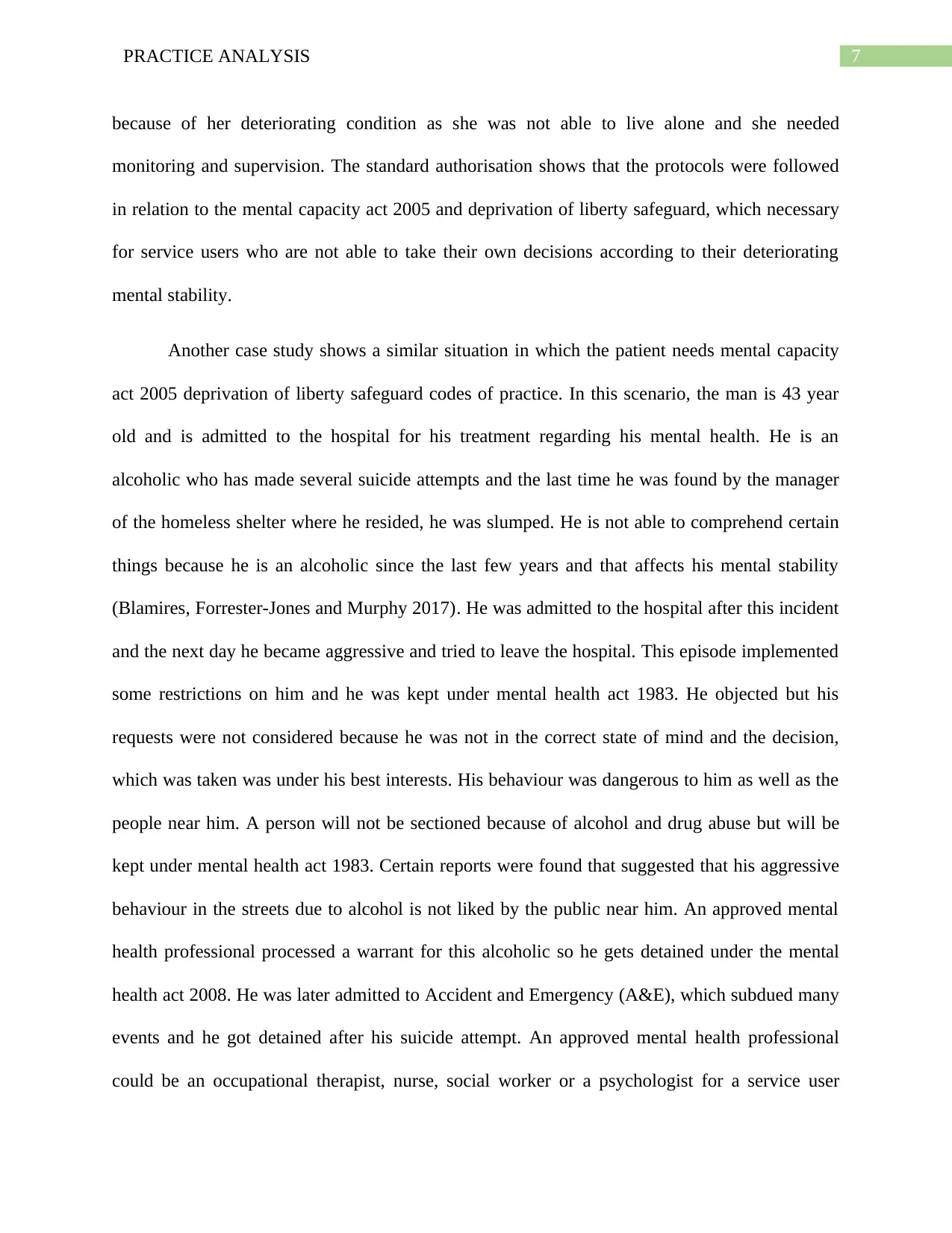
7PRACTICE ANALYSIS
because of her deteriorating condition as she was not able to live alone and she needed
monitoring and supervision. The standard authorisation shows that the protocols were followed
in relation to the mental capacity act 2005 and deprivation of liberty safeguard, which necessary
for service users who are not able to take their own decisions according to their deteriorating
mental stability.
Another case study shows a similar situation in which the patient needs mental capacity
act 2005 deprivation of liberty safeguard codes of practice. In this scenario, the man is 43 year
old and is admitted to the hospital for his treatment regarding his mental health. He is an
alcoholic who has made several suicide attempts and the last time he was found by the manager
of the homeless shelter where he resided, he was slumped. He is not able to comprehend certain
things because he is an alcoholic since the last few years and that affects his mental stability
(Blamires, Forrester‐Jones and Murphy 2017). He was admitted to the hospital after this incident
and the next day he became aggressive and tried to leave the hospital. This episode implemented
some restrictions on him and he was kept under mental health act 1983. He objected but his
requests were not considered because he was not in the correct state of mind and the decision,
which was taken was under his best interests. His behaviour was dangerous to him as well as the
people near him. A person will not be sectioned because of alcohol and drug abuse but will be
kept under mental health act 1983. Certain reports were found that suggested that his aggressive
behaviour in the streets due to alcohol is not liked by the public near him. An approved mental
health professional processed a warrant for this alcoholic so he gets detained under the mental
health act 2008. He was later admitted to Accident and Emergency (A&E), which subdued many
events and he got detained after his suicide attempt. An approved mental health professional
could be an occupational therapist, nurse, social worker or a psychologist for a service user
because of her deteriorating condition as she was not able to live alone and she needed
monitoring and supervision. The standard authorisation shows that the protocols were followed
in relation to the mental capacity act 2005 and deprivation of liberty safeguard, which necessary
for service users who are not able to take their own decisions according to their deteriorating
mental stability.
Another case study shows a similar situation in which the patient needs mental capacity
act 2005 deprivation of liberty safeguard codes of practice. In this scenario, the man is 43 year
old and is admitted to the hospital for his treatment regarding his mental health. He is an
alcoholic who has made several suicide attempts and the last time he was found by the manager
of the homeless shelter where he resided, he was slumped. He is not able to comprehend certain
things because he is an alcoholic since the last few years and that affects his mental stability
(Blamires, Forrester‐Jones and Murphy 2017). He was admitted to the hospital after this incident
and the next day he became aggressive and tried to leave the hospital. This episode implemented
some restrictions on him and he was kept under mental health act 1983. He objected but his
requests were not considered because he was not in the correct state of mind and the decision,
which was taken was under his best interests. His behaviour was dangerous to him as well as the
people near him. A person will not be sectioned because of alcohol and drug abuse but will be
kept under mental health act 1983. Certain reports were found that suggested that his aggressive
behaviour in the streets due to alcohol is not liked by the public near him. An approved mental
health professional processed a warrant for this alcoholic so he gets detained under the mental
health act 2008. He was later admitted to Accident and Emergency (A&E), which subdued many
events and he got detained after his suicide attempt. An approved mental health professional
could be an occupational therapist, nurse, social worker or a psychologist for a service user
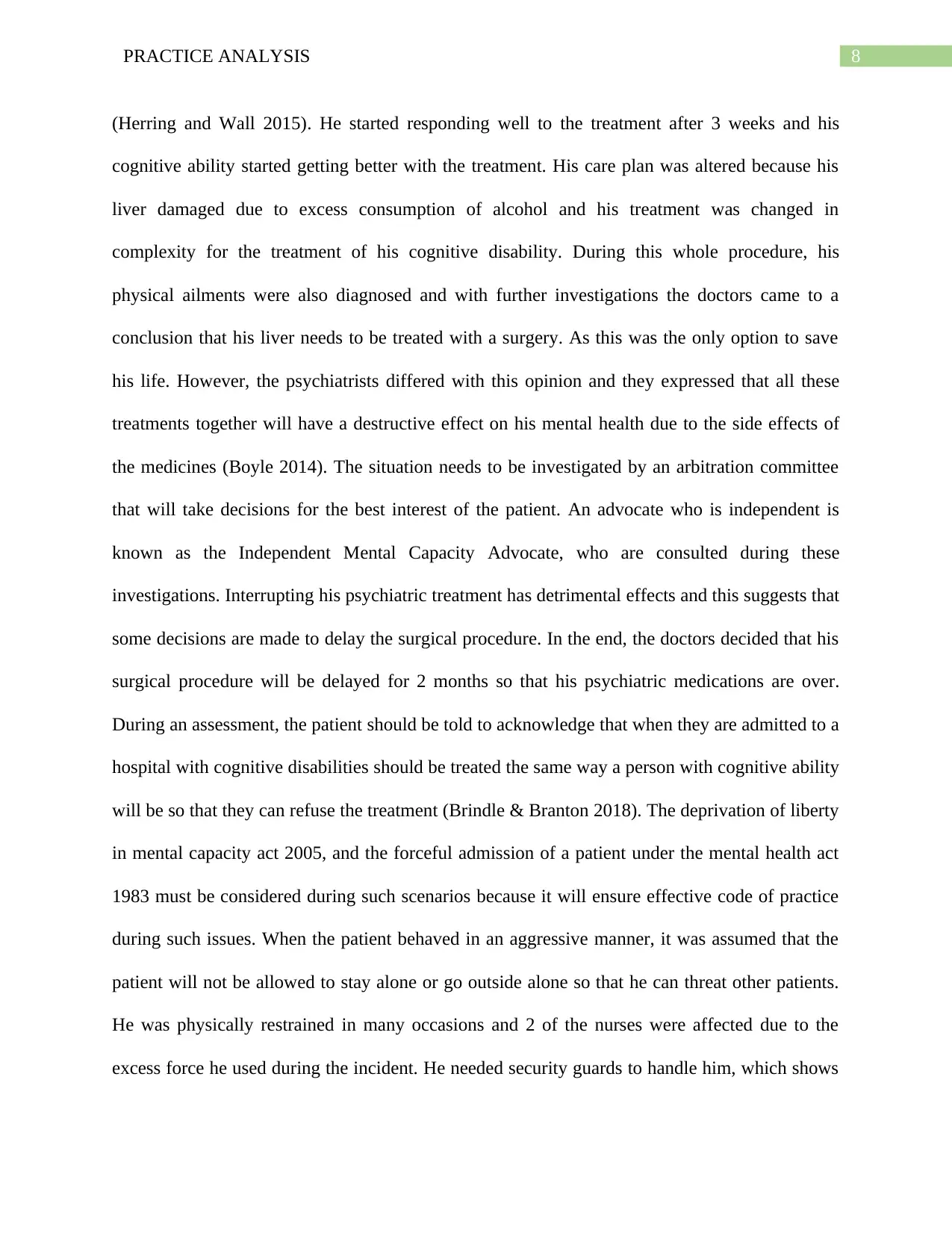
8PRACTICE ANALYSIS
(Herring and Wall 2015). He started responding well to the treatment after 3 weeks and his
cognitive ability started getting better with the treatment. His care plan was altered because his
liver damaged due to excess consumption of alcohol and his treatment was changed in
complexity for the treatment of his cognitive disability. During this whole procedure, his
physical ailments were also diagnosed and with further investigations the doctors came to a
conclusion that his liver needs to be treated with a surgery. As this was the only option to save
his life. However, the psychiatrists differed with this opinion and they expressed that all these
treatments together will have a destructive effect on his mental health due to the side effects of
the medicines (Boyle 2014). The situation needs to be investigated by an arbitration committee
that will take decisions for the best interest of the patient. An advocate who is independent is
known as the Independent Mental Capacity Advocate, who are consulted during these
investigations. Interrupting his psychiatric treatment has detrimental effects and this suggests that
some decisions are made to delay the surgical procedure. In the end, the doctors decided that his
surgical procedure will be delayed for 2 months so that his psychiatric medications are over.
During an assessment, the patient should be told to acknowledge that when they are admitted to a
hospital with cognitive disabilities should be treated the same way a person with cognitive ability
will be so that they can refuse the treatment (Brindle & Branton 2018). The deprivation of liberty
in mental capacity act 2005, and the forceful admission of a patient under the mental health act
1983 must be considered during such scenarios because it will ensure effective code of practice
during such issues. When the patient behaved in an aggressive manner, it was assumed that the
patient will not be allowed to stay alone or go outside alone so that he can threat other patients.
He was physically restrained in many occasions and 2 of the nurses were affected due to the
excess force he used during the incident. He needed security guards to handle him, which shows
(Herring and Wall 2015). He started responding well to the treatment after 3 weeks and his
cognitive ability started getting better with the treatment. His care plan was altered because his
liver damaged due to excess consumption of alcohol and his treatment was changed in
complexity for the treatment of his cognitive disability. During this whole procedure, his
physical ailments were also diagnosed and with further investigations the doctors came to a
conclusion that his liver needs to be treated with a surgery. As this was the only option to save
his life. However, the psychiatrists differed with this opinion and they expressed that all these
treatments together will have a destructive effect on his mental health due to the side effects of
the medicines (Boyle 2014). The situation needs to be investigated by an arbitration committee
that will take decisions for the best interest of the patient. An advocate who is independent is
known as the Independent Mental Capacity Advocate, who are consulted during these
investigations. Interrupting his psychiatric treatment has detrimental effects and this suggests that
some decisions are made to delay the surgical procedure. In the end, the doctors decided that his
surgical procedure will be delayed for 2 months so that his psychiatric medications are over.
During an assessment, the patient should be told to acknowledge that when they are admitted to a
hospital with cognitive disabilities should be treated the same way a person with cognitive ability
will be so that they can refuse the treatment (Brindle & Branton 2018). The deprivation of liberty
in mental capacity act 2005, and the forceful admission of a patient under the mental health act
1983 must be considered during such scenarios because it will ensure effective code of practice
during such issues. When the patient behaved in an aggressive manner, it was assumed that the
patient will not be allowed to stay alone or go outside alone so that he can threat other patients.
He was physically restrained in many occasions and 2 of the nurses were affected due to the
excess force he used during the incident. He needed security guards to handle him, which shows
⊘ This is a preview!⊘
Do you want full access?
Subscribe today to unlock all pages.

Trusted by 1+ million students worldwide
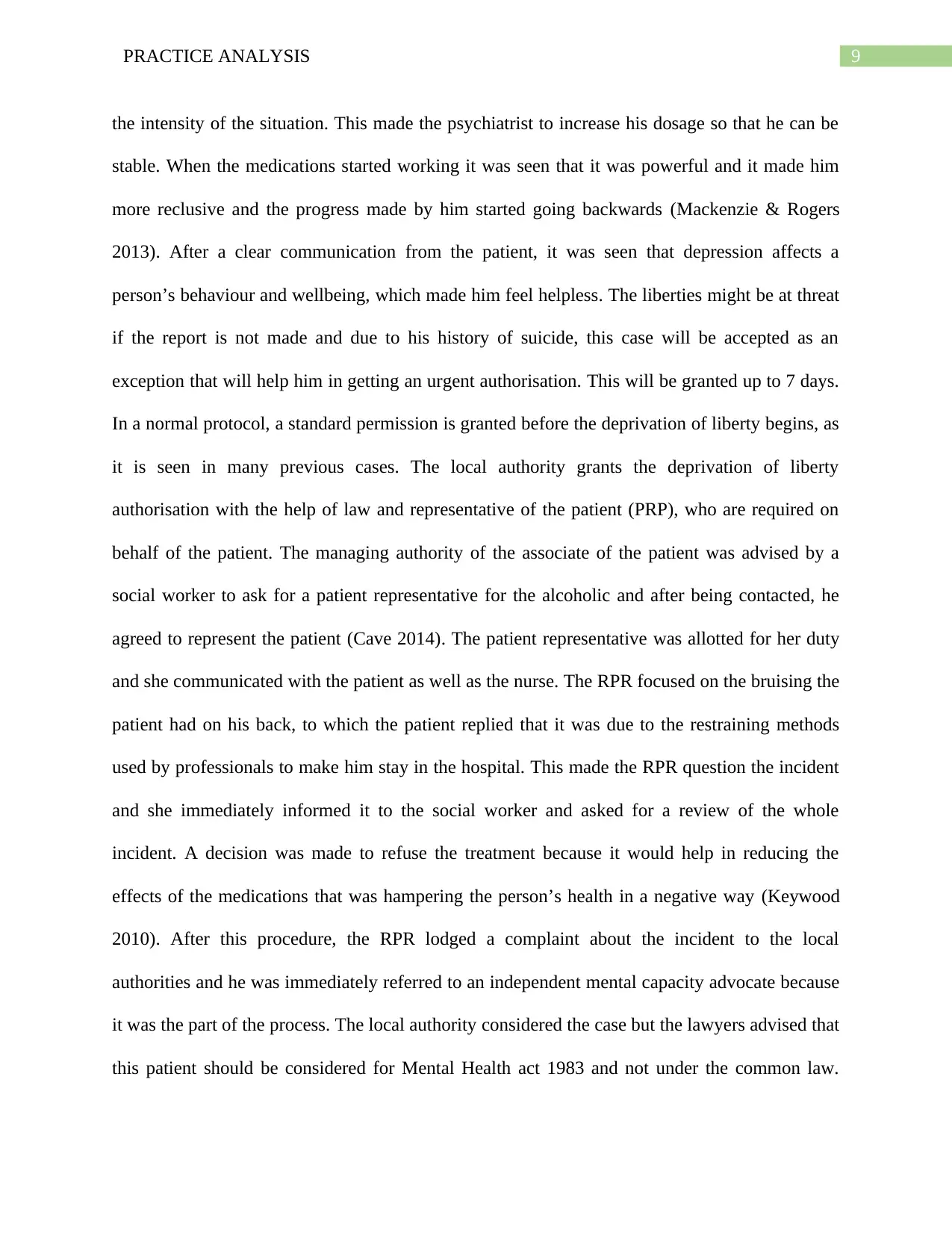
9PRACTICE ANALYSIS
the intensity of the situation. This made the psychiatrist to increase his dosage so that he can be
stable. When the medications started working it was seen that it was powerful and it made him
more reclusive and the progress made by him started going backwards (Mackenzie & Rogers
2013). After a clear communication from the patient, it was seen that depression affects a
person’s behaviour and wellbeing, which made him feel helpless. The liberties might be at threat
if the report is not made and due to his history of suicide, this case will be accepted as an
exception that will help him in getting an urgent authorisation. This will be granted up to 7 days.
In a normal protocol, a standard permission is granted before the deprivation of liberty begins, as
it is seen in many previous cases. The local authority grants the deprivation of liberty
authorisation with the help of law and representative of the patient (PRP), who are required on
behalf of the patient. The managing authority of the associate of the patient was advised by a
social worker to ask for a patient representative for the alcoholic and after being contacted, he
agreed to represent the patient (Cave 2014). The patient representative was allotted for her duty
and she communicated with the patient as well as the nurse. The RPR focused on the bruising the
patient had on his back, to which the patient replied that it was due to the restraining methods
used by professionals to make him stay in the hospital. This made the RPR question the incident
and she immediately informed it to the social worker and asked for a review of the whole
incident. A decision was made to refuse the treatment because it would help in reducing the
effects of the medications that was hampering the person’s health in a negative way (Keywood
2010). After this procedure, the RPR lodged a complaint about the incident to the local
authorities and he was immediately referred to an independent mental capacity advocate because
it was the part of the process. The local authority considered the case but the lawyers advised that
this patient should be considered for Mental Health act 1983 and not under the common law.
the intensity of the situation. This made the psychiatrist to increase his dosage so that he can be
stable. When the medications started working it was seen that it was powerful and it made him
more reclusive and the progress made by him started going backwards (Mackenzie & Rogers
2013). After a clear communication from the patient, it was seen that depression affects a
person’s behaviour and wellbeing, which made him feel helpless. The liberties might be at threat
if the report is not made and due to his history of suicide, this case will be accepted as an
exception that will help him in getting an urgent authorisation. This will be granted up to 7 days.
In a normal protocol, a standard permission is granted before the deprivation of liberty begins, as
it is seen in many previous cases. The local authority grants the deprivation of liberty
authorisation with the help of law and representative of the patient (PRP), who are required on
behalf of the patient. The managing authority of the associate of the patient was advised by a
social worker to ask for a patient representative for the alcoholic and after being contacted, he
agreed to represent the patient (Cave 2014). The patient representative was allotted for her duty
and she communicated with the patient as well as the nurse. The RPR focused on the bruising the
patient had on his back, to which the patient replied that it was due to the restraining methods
used by professionals to make him stay in the hospital. This made the RPR question the incident
and she immediately informed it to the social worker and asked for a review of the whole
incident. A decision was made to refuse the treatment because it would help in reducing the
effects of the medications that was hampering the person’s health in a negative way (Keywood
2010). After this procedure, the RPR lodged a complaint about the incident to the local
authorities and he was immediately referred to an independent mental capacity advocate because
it was the part of the process. The local authority considered the case but the lawyers advised that
this patient should be considered for Mental Health act 1983 and not under the common law.
Paraphrase This Document
Need a fresh take? Get an instant paraphrase of this document with our AI Paraphraser
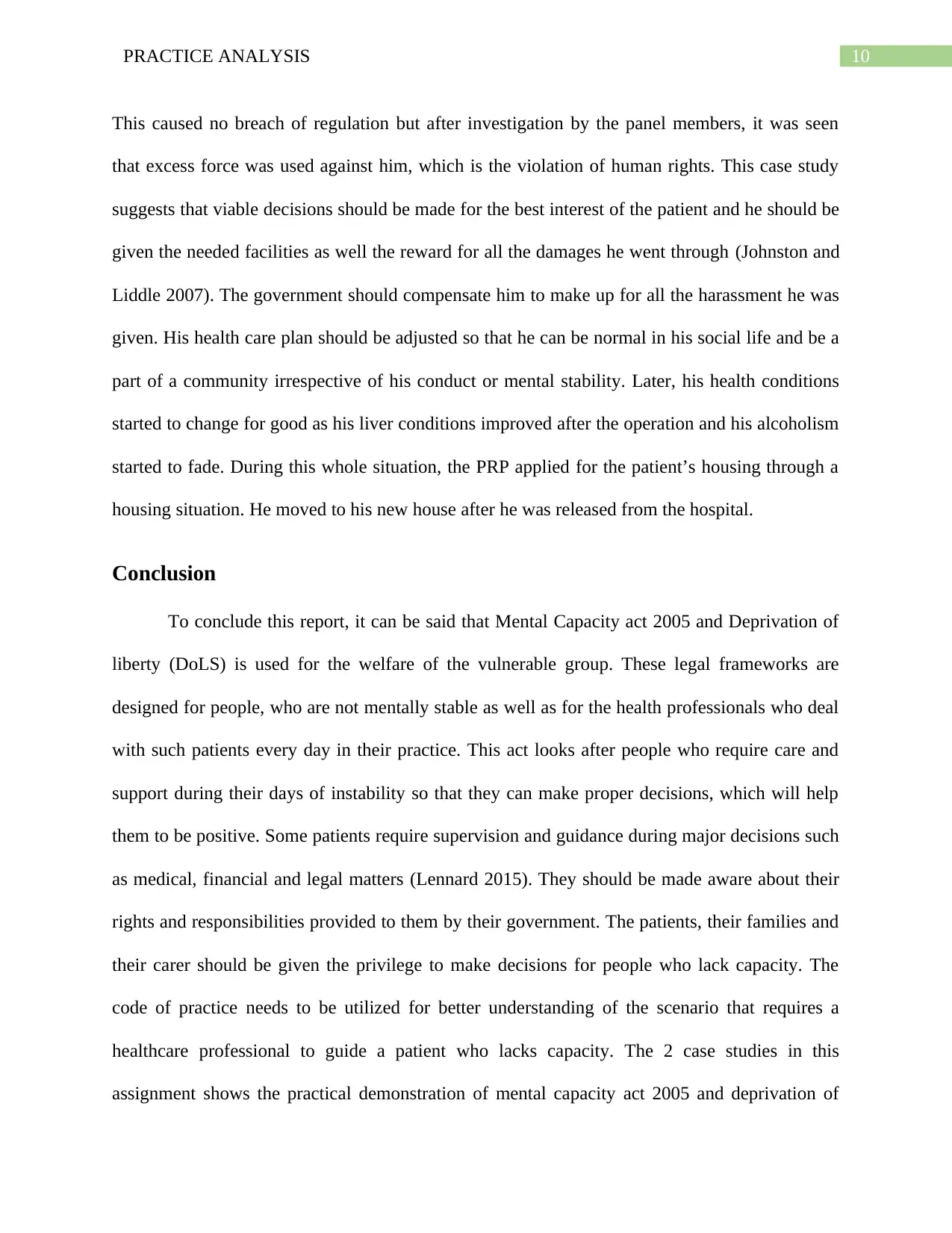
10PRACTICE ANALYSIS
This caused no breach of regulation but after investigation by the panel members, it was seen
that excess force was used against him, which is the violation of human rights. This case study
suggests that viable decisions should be made for the best interest of the patient and he should be
given the needed facilities as well the reward for all the damages he went through (Johnston and
Liddle 2007). The government should compensate him to make up for all the harassment he was
given. His health care plan should be adjusted so that he can be normal in his social life and be a
part of a community irrespective of his conduct or mental stability. Later, his health conditions
started to change for good as his liver conditions improved after the operation and his alcoholism
started to fade. During this whole situation, the PRP applied for the patient’s housing through a
housing situation. He moved to his new house after he was released from the hospital.
Conclusion
To conclude this report, it can be said that Mental Capacity act 2005 and Deprivation of
liberty (DoLS) is used for the welfare of the vulnerable group. These legal frameworks are
designed for people, who are not mentally stable as well as for the health professionals who deal
with such patients every day in their practice. This act looks after people who require care and
support during their days of instability so that they can make proper decisions, which will help
them to be positive. Some patients require supervision and guidance during major decisions such
as medical, financial and legal matters (Lennard 2015). They should be made aware about their
rights and responsibilities provided to them by their government. The patients, their families and
their carer should be given the privilege to make decisions for people who lack capacity. The
code of practice needs to be utilized for better understanding of the scenario that requires a
healthcare professional to guide a patient who lacks capacity. The 2 case studies in this
assignment shows the practical demonstration of mental capacity act 2005 and deprivation of
This caused no breach of regulation but after investigation by the panel members, it was seen
that excess force was used against him, which is the violation of human rights. This case study
suggests that viable decisions should be made for the best interest of the patient and he should be
given the needed facilities as well the reward for all the damages he went through (Johnston and
Liddle 2007). The government should compensate him to make up for all the harassment he was
given. His health care plan should be adjusted so that he can be normal in his social life and be a
part of a community irrespective of his conduct or mental stability. Later, his health conditions
started to change for good as his liver conditions improved after the operation and his alcoholism
started to fade. During this whole situation, the PRP applied for the patient’s housing through a
housing situation. He moved to his new house after he was released from the hospital.
Conclusion
To conclude this report, it can be said that Mental Capacity act 2005 and Deprivation of
liberty (DoLS) is used for the welfare of the vulnerable group. These legal frameworks are
designed for people, who are not mentally stable as well as for the health professionals who deal
with such patients every day in their practice. This act looks after people who require care and
support during their days of instability so that they can make proper decisions, which will help
them to be positive. Some patients require supervision and guidance during major decisions such
as medical, financial and legal matters (Lennard 2015). They should be made aware about their
rights and responsibilities provided to them by their government. The patients, their families and
their carer should be given the privilege to make decisions for people who lack capacity. The
code of practice needs to be utilized for better understanding of the scenario that requires a
healthcare professional to guide a patient who lacks capacity. The 2 case studies in this
assignment shows the practical demonstration of mental capacity act 2005 and deprivation of
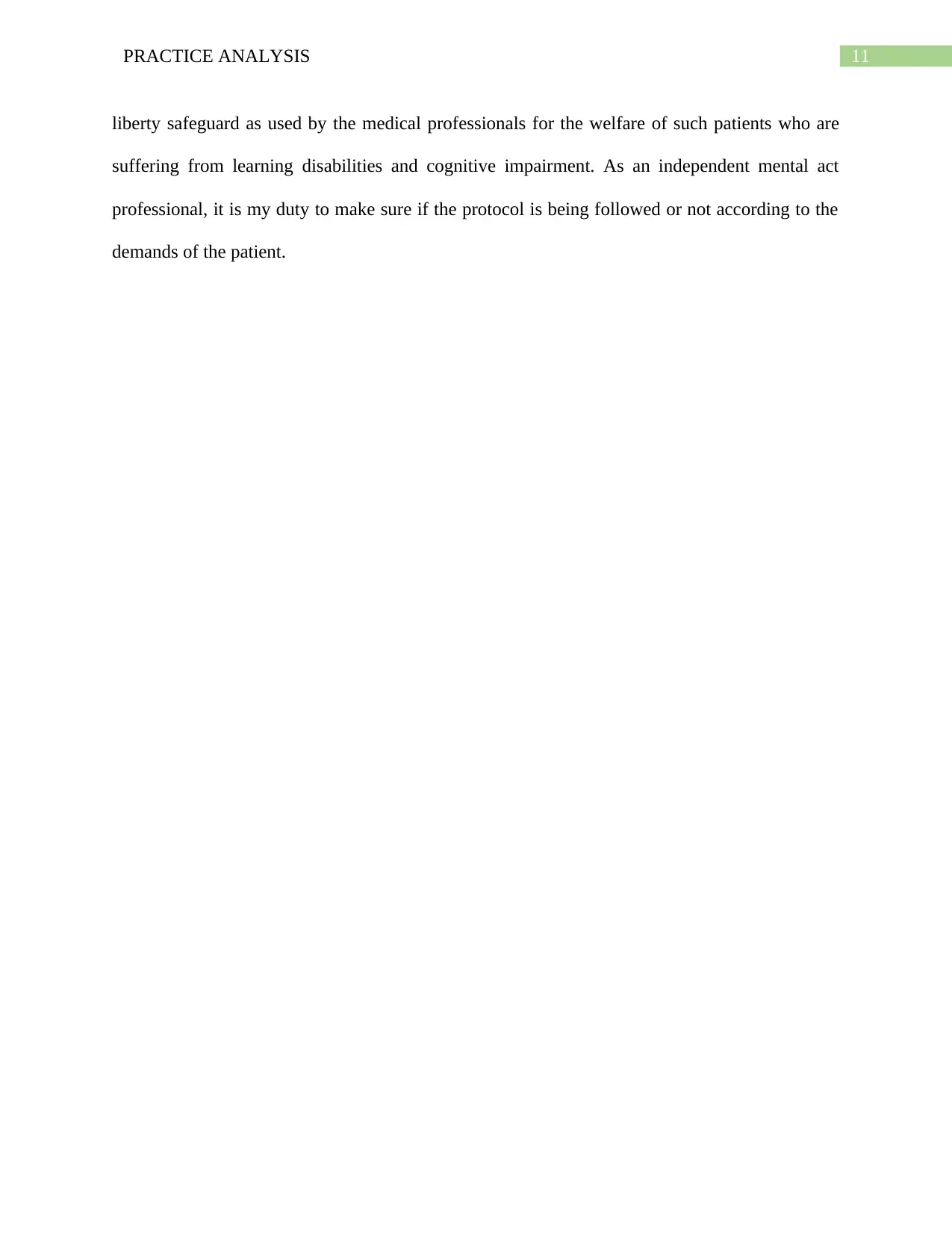
11PRACTICE ANALYSIS
liberty safeguard as used by the medical professionals for the welfare of such patients who are
suffering from learning disabilities and cognitive impairment. As an independent mental act
professional, it is my duty to make sure if the protocol is being followed or not according to the
demands of the patient.
liberty safeguard as used by the medical professionals for the welfare of such patients who are
suffering from learning disabilities and cognitive impairment. As an independent mental act
professional, it is my duty to make sure if the protocol is being followed or not according to the
demands of the patient.
⊘ This is a preview!⊘
Do you want full access?
Subscribe today to unlock all pages.

Trusted by 1+ million students worldwide
1 out of 16
Related Documents
Your All-in-One AI-Powered Toolkit for Academic Success.
+13062052269
info@desklib.com
Available 24*7 on WhatsApp / Email
![[object Object]](/_next/static/media/star-bottom.7253800d.svg)
Unlock your academic potential
Copyright © 2020–2026 A2Z Services. All Rights Reserved. Developed and managed by ZUCOL.





